八年级新世纪英语说课 Culture and Customs ( Revision )说课
初二英语新世纪教材八第一单元备课参考教案
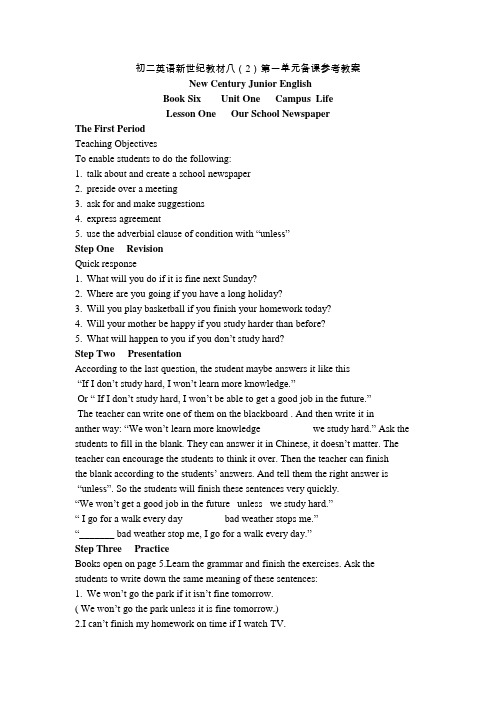
初二英语新世纪教材八(2)第一单元备课参考教案New Century Junior EnglishBook Six Unit One Campus LifeLesson One Our School NewspaperThe First PeriodTeaching ObjectivesTo enable students to do the following:1. talk about and create a school newspaper2. preside over a meeting3. ask for and make suggestions4. express agreement5. use the adverbial clause of condition with “unless”Step One RevisionQuick response1. What will you do if it is fine next Sunday?2. Where are you going if you have a long holiday?3. Will you play basketball if you finish your homework today?4. Will your mother be happy if you study harder than before?5. What will happen to you if you don’t study hard?Step Two PresentationAccording to the last question, the student maybe answers it like this“If I don’t study hard, I won’t learn more knowledge.”Or “ If I don’t study hard, I won’t be able to get a good job in the future.”The teacher can write one of them on the blackboard . And then write it inanther way: “We won’t learn more knowledge __________we study hard.” Ask the students to fill in the blank. They can answer it in Chinese, it doesn’t matter. The teacher can encourage the students to think it over. Then the teacher can finishthe blank according to the students’ answers. And tell them the right answer is “unless”. So the students will finish these sentences very quickly.“We won’t get a good job in the future _unless_ we study hard.”“ I go for a walk every day ________bad weather stops me.”“_______ bad weather stop me, I go for a walk every day.”Step Three PracticeBooks open on page 5.Learn the grammar and finish the exercises. Ask the students to write down the same meaning of these sentences:1. We won’t go the park if it isn’t fine tomorrow.( We won’t go the park unless it is fine tomorrow.)2.I can’t finish my homework on time if I watch TV.(I can finish my homework on time if I don’t watch TV.)( I can’t finish my homework on time unless I watch TV.3.I will come to see you this afternoon if you aren’t busy.( I will come to see you this afternoon unless you are busy.)4.I will listen to the music if I don’t have anything important to do.5.We won’t have an English party if we don’t have enough time to prepare for it. Step Four Exercises Page 2 of the workbookStep Five HomeworkReview the grammar and prepare the new words and the text.The Second PeriodAims and demands:1. to learn the text2. to act according to the text3. to master some useful phrasesStep 1 Revision1. A duty report2. Ask the students to finish these sentences with unlessa. You won’t pass the exams unless____________________.b. You will be late for the class unless_____________________________.Step 2 PresentationThe teacher can show the students the newspaper the students are familiar with..And then teach them to learn the new words “chief, section reader,” Tell the students that we will publish a school newspaper. So encourage them to set the rolling. And write down the new words on the blackboard. Ask them who has a good idea.The teacher can teach the word “suggest” and tell them how to use it.Step 3 Listen and answera. Who is chief editor of the school newspaper?b. What is she doing?c. What are they going to doing?d. Do they have any ideas? What are they?Listen three times.Step 4 Listen and learna. get started== start doing somethingb. sound +adj; sound like +nc. suggest +n; v-ing; object clauseDrills:1. How do you feel about something/sb.?2. I couldn’t agree more .==I certainly agree.3. What’s your view on sth.?Step 5 Listen and actStep 6 Finish the check on page 4Step 7 Homework1. Read the text2. Try to create a class newspaperThe Third PeriodStep 1 Revisiona. Review the text. b Ask the students to actb. Review the phrases and drillsStep 2 PresentationThe main task is to learn the developing skillsModel one: A: English is very important. How do you feel about it?B: I couldn’t agree more.Tell the students to ask and answer in pairs according to the example.Model two:A; It’s very important for a school newspaper to have interesting sections.B: I couldn’t agree more. A newspaper won’t be a success unless it has interesting sections.C: Exactly. If a newspaper doesn’t have interesting sections, it won’t attractits readers.Books open on page 6Step 3 ListeningBefore listening to it, the teacher can show the new words of the listening.Let the students read a newspaper created by themselves.Listen three timesStep 4 Group workAsk and answer in pairs about the tasks.Step 5 HomeworkWrite two dialogues according to the model on page 9The Fourth PeriodStep 1.Revisiona. Bring the students’ newspaper to the classroom, exchange it with each other . Then select the best paper.b. Review the new words of part two.Step 2. Readinga. Listen and answer some questions1. Is the school newspaper going to be published once a month?2. What is the reading about?3. Is there any pay for these jobs?b. Listen again and finish the questions on page 10c. Listen and read and finish the second task.Step 3 Writinga. The teacher can ask the students to answer the questions.b. Then ask the good students to finish the writing.c. Ask two students to write the short composition on the blackboard.Step 4. HomeworkFinish the workbookLesson Two At the School LibraryThe First PeriodTeaching objectivesTo enable students to do the following:1. talk about library rules and borrow books in a foreign library2. use the adverbial clause of purpose with so that3. use the adverbial clause of time with till and not….untilStep 1 Revision1.A duty report.2.Quick responsesa. What do we call the man who is the main editor? (Chief editor)b. In a newspaper there are many parts. What do we call them in English? (Sections)c. If you are an editor, what is the most important thing for you?( I should have a high sense of responsibility.)What qualities do you have?Step 2 PresentationTuning inWe can read newspapers and magazines in our school reading room. That is a good way to improve our reading skills. But sometimes we can’t finish reading them on time. What shall we do? The students maybe answer it like this “We can borrow them .” Tell the students to borrow books from the library. And we must obey the library rules. Ask the students to say something about the rules. Try to speak inEnglish. When they can’t express clearly, the teacher can help them to finishin English and teach them to learn the new words of tuning in.Step 3. Ask and answer in pairsStep 4 PresentationTextAsk the students how to say it in English if you are a librarian when somebody wants to borrow books. They may answer like this :Librarian: May I help you? Or: What can I do for you?Ss: Yes, please. I’d like to borrow some books on…… .How can I find them? Librarian: You can check for them on the computer first.Step 5 Listen and answer1.Who is talking?2.Where are they talking?3.What does Li Qiang want to do?4.How many books do he want to borrow? Step 6 Listen and answer1. Can Li Qiang find the books?2.What can he do?3.How can he recall them?Step 7.Listen and readStep 8. Read and actStep 9 Homework1. Remember the phrases2. Finish the comprehension checkThe Second PeriodStep 1 Revision1. Ask the students to act2. Quick responses:a. Why did Li Qiang want to borrow some books?(Because he wanted to find more information for his project)(In order to find more information for his project.)b. How can Li Qiang quickly find books at the library?c. How many books can he borrow at a time?d. How long can he keep them?e. How can he borrow a book on loan?Step 2 PresentationWe all know that Li Qiang wanted to borrow some books in order to find some information for his project. Write this sentence on the blackboard. Tell the students to say it in another way. And write it on the blackboard. “Li Qiang wanted to borrow some books so that he could find some information.”Step 3 Practice1.I must get up early in order not to be late.-------------I must get up early so that I won’t be late.2.I want to buy a digital TV in order to enjoy better sound and pictures.-------I want to buy a digital TV so that I can enjoy better sound and pictures.Ask the students to make a sentence with so that.Step 4. ExercisesFinish the exercises on page nine of the workbook.Step 5. HomeworkThe Third PeriodStep 1 Revision1. Review the phrases of the text.2. Review the grammar “ so that”Step 2 PresentationLearn “in that case”A: Mom, I’m afraid I will be late for school.B: In that case, you had better be quick. You mustn’t waste time.Ask the students to make a short dialogue according to the model.Step 3 Group workBooks open on page 19 and four students make up dialogues using the picture and words cues.Step 4 Listening skillsListen and decide if the following statements are true or false :1. Tom is a new student at Dongfang International School.( T)2. This is his second time to borrow books from the library.( F )3. Tom knows how to borrow a book.( F )4. The librarian is very kind and helpful.( T )5. Tom finds the book by himself,( F )Step 5 Listen and finish the blanksStep 6 Pair workWork in pairs and role-play Tom and the librarian.Step 7 Homeworka. Write a library card and a recallb. Prepare the new words of the reading.The Fourth PeriodStep 1 RevisionReview the drills1.…..so that…….2.in that caseStep 2 PresentationWhat is a library? Let the students describe it in English. If they can’t theycay speak Chinese. Try to speak English.Step 3 Listen and answera. What does a library provide with?b. What can children do there?c. What can librarians do there?Step 4 Listen and readStep 5 Read and finish the exercisesStep 6 HomeworkFinish the exercises of the workbookLesson ThreeTeaching objectivesTo enable students to do the following:a. describe a schoolb. create a school homepagec. use the adverbial clause of reason with asI. Tuning in1. Let the students guess the meaning of the new words in Lesson One, we know something about Dongfang International School..It opened in 1954. The same meanin -g is that it was set up in 1954.Do you know Chongming Senior High School. We all hope to study in that school. Why? Because it is the best one in Chongming. It is a key school. (Guess the meaning of a key school)Teach a special-grade teacher and a senior teacher2.Look at the pictures on page 26 and learn the new words.3.Listen to the tape to read the new words of part one.3. Finish the blanks of tuning inII Text learning1. Listen and answer these questionsa. What kind of school is Dongfang International School?b. When was it set up?c. Why does it attract excellent students from both home and abroad?d. How big is it?e. How many classroom buildings are there?f. What are the major courses and the minor courses?2. Listen and read twice3. Finish the Comprehension check4. Explain some phrasesIII. Discovering Language1. Know the meaning of as.2. Group work on page 303. Listening4. Draw the new school plan after the modelIV Reading and writinga. Ask the students to learn the reading by themselves.b. Then they can know the main meaning of the reading according to these questions:1. In the United States, how many years do children spend in elementary school?2. Talk about their teaching equipment.3. Can they go to college without college admission tests?4. What about the students in Brain5. Finish Task 1 and Task 2c. WritingCreate a school homepage of ten sentences.。
初中英语新世纪版八上U2L1知识梳理修改稿
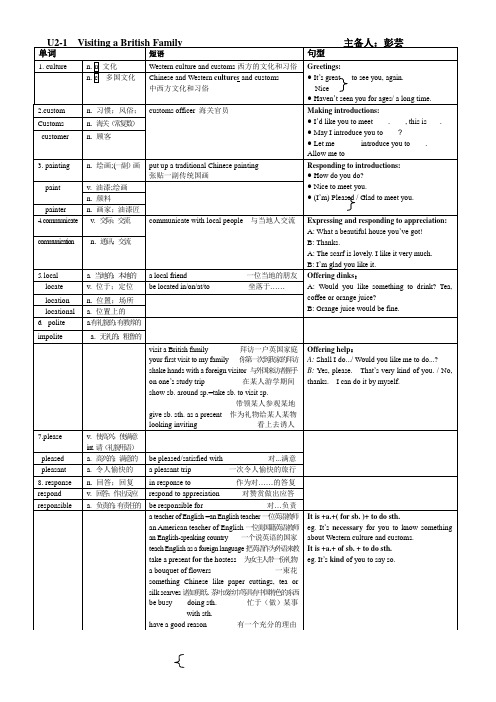
单词短语句型1. culture n. u 文化Western culture and customs 西方的文化和习俗 Greetings:● It ’s great to see you, again. Nice● Haven ’t seen you for ages/ a long time.n. c 多国文化Chinese and Western culture s and customs 中西方文化和习俗2.custom n. 习惯;风俗; customs officer 海关官员 Making introductions:● I ’d like you to meet ×××. ×××, this is ×××. ● May I introduce you to ×××?● Let me introduce you to ×××. Allow me toCustoms n. 海关(常复数) customern. 顾客3. painting n. 绘画;(一副)画 put up a traditional Chinese painting 张贴一副传统国画Responding to introductions: ● How do you do? ● Nice to meet you.● (I ’m) Pleased / Glad to meet you.paintv. 油漆;绘画n. 颜料painter n. 画家;油漆匠 4. communicate v. 交际;交流 communicate with local people 与当地人交流Expressing and responding to appreciation: A: What a beautiful house you ’ve got! B: Thanks.A: The scarf is lovely. I like it very much. B: I ’m glad you like it.com m unica tion n. 通讯;交流5. local a. 当地的;本地的 a local friend 一位当地的朋友Offering dinks :A: Would you like something to drink? Tea, coffee or orange juice?B: Orange juice would be fine. locate v. 位于;定位 be located in/on/at/to 坐落于…… location n. 位置;场所locational a. 位置上的 6. polite a.有礼貌的;有教养的impolite a. 无礼的;粗鲁的visit a British family 拜访一户英国家庭your first visit to my family 你第一次到我家的拜访 shake hands with a foreign visitor 与外国来访者握手 on one ’s study trip 在某人游学期间 show sb. around sp.=take sb. to visit sp.带领某人参观某地give sb. sth. as a present 作为礼物给某人某物 looking inviting 看上去诱人 Offering help :A: Shall I do.../ Would you like me to do...? B: Yes, please. That ’s very kind of you. / No, thanks. I can do it by myself.7.please v. 使高兴,使满意 int. 请(礼貌用语)pleased a. 高兴的;满意的 be pleased/satisfied with 对...满意 pleasant a. 令人愉快的 a pleasant trip 一次令人愉快的旅行 8. response n. 回答;回复 in response to 作为对……的答复respond v. 回答;作出反应respond to appreciation 对赞赏做出应答responsible a. 负责的;有责任的 be responsible for 对…负责a teacher of English =an English teacher 一位英语教师 an American teacher of English 一位美国籍英语教师 an English-speaking country 一个说英语的国家 teach English as a foreign language 把英语作为外语来教 take a present for the hostess 为女主人带一份礼物 a bouquet of flowers 一束花 something Chinese like paper cuttings, tea or silk scarves 诸如剪纸、茶叶或丝巾等具有中国特色的东西 be busy doing sth. 忙于(做)某事 with sth.have a good reason 有一个充分的理由It is +a.+( for sb. )+ to do sth.eg. It ’s necessary for you to know something about Western culture and customs. It is +a.+ of sb. + to do sth. eg. It ’s kind of you to say so.The adverbial clause of reason 原因状语从句1.since 意为“既然,由于”,用于双方都清楚的已知事实,相当于now that, 语气较because弱。
新世纪英语八年级上册教案
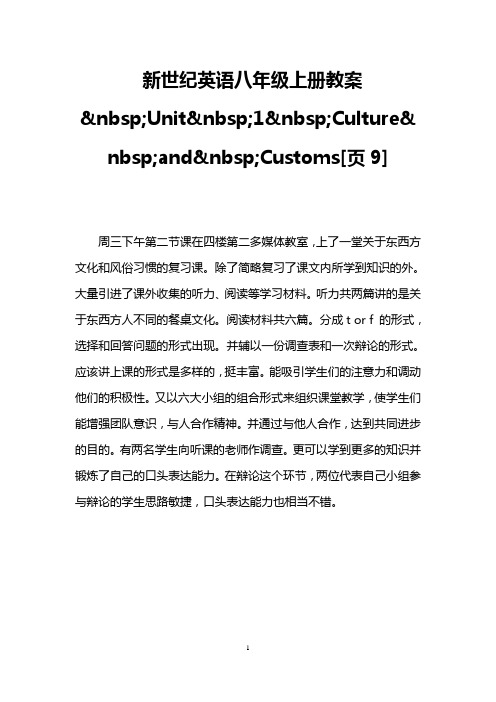
新世纪英语八年级上册教案
Unit 1 Culture& nbsp;and Customs[页9]
周三下午第二节课在四楼第二多媒体教室,上了一堂关于东西方文化和风俗习惯的复习课。
除了简略复习了课文内所学到知识的外。
大量引进了课外收集的听力、阅读等学习材料。
听力共两篇讲的是关于东西方人不同的餐桌文化。
阅读材料共六篇。
分成t or f 的形式,选择和回答问题的形式出现。
并辅以一份调查表和一次辩论的形式。
应该讲上课的形式是多样的,挺丰富。
能吸引学生们的注意力和调动他们的积极性。
又以六大小组的组合形式来组织课堂教学,使学生们能增强团队意识,与人合作精神。
并通过与他人合作,达到共同进步的目的。
有两名学生向听课的老师作调查。
更可以学到更多的知识并锻炼了自己的口头表达能力。
在辩论这个环节,两位代表自己小组参与辩论的学生思路敏捷,口头表达能力也相当不错。
1。
八年级英语上册 Unit2 culture and customs Lesson 3
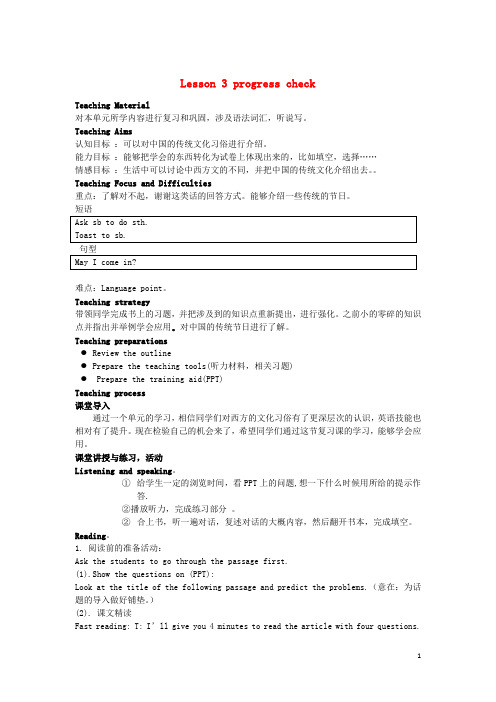
Lesson 3 progress checkTeaching Material对本单元所学内容进行复习和巩固,涉及语法词汇,听说写。
Teaching Aims认知目标:可以对中国的传统文化习俗进行介绍。
能力目标:能够把学会的东西转化为试卷上体现出来的,比如填空,选择……情感目标:生活中可以讨论中西方文的不同,并把中国的传统文化介绍出去。
Teaching Focus and Difficulties重点:了解对不起,谢谢这类话的回答方式。
能够介绍一些传统的节日。
句型难点:Language point。
Teaching strategy带领同学完成书上的习题,并把涉及到的知识点重新提出,进行强化。
之前小的零碎的知识点并指出并举例学会应用。
对中国的传统节日进行了解。
Teaching preparations●Review the outline●Prepare the teaching tools(听力材料,相关习题)● Prepare the training aid(PPT)Teaching process课堂导入通过一个单元的学习,相信同学们对西方的文化习俗有了更深层次的认识,英语技能也相对有了提升。
现在检验自己的机会来了,希望同学们通过这节复习课的学习,能够学会应用。
课堂讲授与练习,活动Listening and speaking。
①给学生一定的浏览时间,看PPT上的问题,想一下什么时候用所给的提示作答.②播放听力,完成练习部分。
②合上书,听一遍对话,复述对话的大概内容,然后翻开书本,完成填空。
Reading。
1. 阅读前的准备活动:Ask the students to go through the passage first.(1).Show the questions on (PPT):Look at the title of the following passage and predict the problems.(意在:为话题的导入做好铺垫。
新世纪英语八年级上册说课稿 Culture and Customs ( Revision )
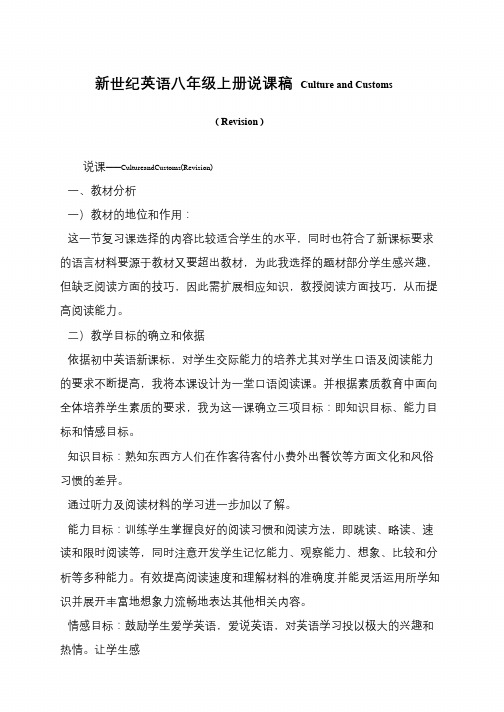
新世纪英语八年级上册说课稿Culture and Customs
( Revision )
说课——CultureandCustoms(Revision)
一、教材分析
一)教材的地位和作用:
这一节复习课选择的内容比较适合学生的水平,同时也符合了新课标要求的语言材料要源于教材又要超出教材,为此我选择的题材部分学生感兴趣,但缺乏阅读方面的技巧,因此需扩展相应知识,教授阅读方面技巧,从而提高阅读能力。
二)教学目标的确立和依据
依据初中英语新课标,对学生交际能力的培养尤其对学生口语及阅读能力的要求不断提高,我将本课设计为一堂口语阅读课。
并根据素质教育中面向全体培养学生素质的要求,我为这一课确立三项目标:即知识目标、能力目标和情感目标。
知识目标:熟知东西方人们在作客待客付小费外出餐饮等方面文化和风俗习惯的差异。
通过听力及阅读材料的学习进一步加以了解。
能力目标:训练学生掌握良好的阅读习惯和阅读方法,即跳读、略读、速读和限时阅读等,同时注意开发学生记忆能力、观察能力、想象、比较和分析等多种能力。
有效提高阅读速度和理解材料的准确度.并能灵活运用所学知识并展开丰富地想象力流畅地表达其他相关内容。
情感目标:鼓励学生爱学英语,爱说英语,对英语学习投以极大的兴趣和热情。
让学生感。
【K12学习】新世纪英语八年级上册教案 Unit 1 Culture and Customs
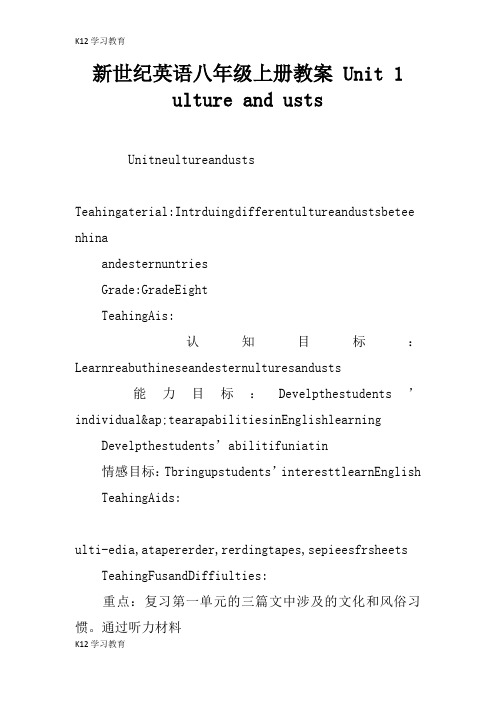
新世纪英语八年级上册教案 Unit 1ulture and ustsUnitneultureandustsTeahingaterial:Intrduingdifferentultureandustsbetee nhinaandesternuntriesGrade:GradeEightTeahingAis:认知目标:Learnreabuthineseandesternulturesandusts能力目标:Develpthestudents’individual≈tearapabilitiesinEnglishlearning Develpthestudents’abilitifuniatin情感目标:Tbringupstudents’interesttlearnEnglish TeahingAids:ulti-edia,atapererder,rerdingtapes,sepieesfrsheets TeahingFusandDiffiulties:重点:复习第一单元的三篇文中涉及的文化和风俗习惯。
通过听力材料和阅读材料的学习了解更多的中西文化和生活习惯的差异。
2难点:Tas3的完成是个难点,学生可能会花较多时间也很难做得较完整。
3解决方法:教师引领,自主探究,小组合作,共享成功。
TeahingPress:RevieListenReadSurveDebatenluderiteTeahingdesign:Iaring-up:Revie “TsasethingabuttheiprtanefEnglish”IIListenttshrtpassagesandfinishtheexerisesIIIAsurve:DifferentpininsabuttippingSURVE:TIPPINGFRAGAINSTenuragetheserviepepletrbetteraetheserviepeplegreedIVReadseaterialstnreabuthineseandesternulturesandus tsVAdebate:arguentsfrragainsteatingutDEBATE:ISITAGDIDEATEATUTFRAGAINSTsavetieverexpensiveVIHer:AnlusinhineseesternTraditinalfestivalsSpringfestivalhristasDeratethehuseithpituresandupletsDeratethehuseithahristastreeGreetingeahtherithHaveueatenurbreafast/lunh/supperet?RespnsestpraiseReeivingagiftfravisitrStaplefdanddrinsasfingvegetablesEatingithTraffirulersTipstVIIHerII:Finishthepsitinrall“Theadvantagesanddisadvantagesftippingandeatingut”Iaring-up:Revie “TsasethingabuttheiprtanefEnglish”Teaher’sativit:Teahergivesutsequestinsustlie: hdulearnEnglish?HdulearnEnglish?HanulearnEnglishell?hatanudtiprveurEnglish?uldulietbevlunteershentheXXExpisheldinShanghai?Ifuanttuniateiththefreignersell,ushuldnreabuttheiru ltureandustsLearners’ativities:ThestudentsananserthequestinsardingtUnit4 andhatthehavelearnedbefreTheanalsasandanserrequestinseahther?Aifdesign:要学好英语,将来更好地为社会服务,了解更多的外国文化和风俗习惯是很必要的。
新世纪英语八年级上册教案
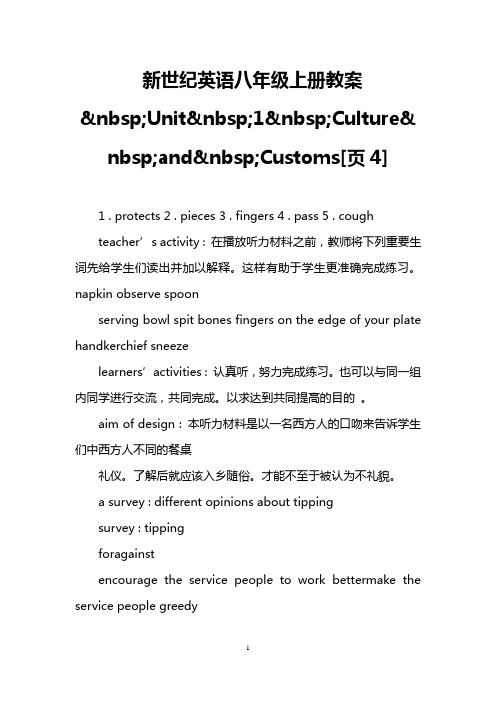
新世纪英语八年级上册教案 Unit 1 Culture& nbsp;and Customs[页4]1 . protects2 . pieces3 . fingers4 . pass5 . coughteacher’s activity : 在播放听力材料之前,教师将下列重要生词先给学生们读出并加以解释。
这样有助于学生更准确完成练习。
napkin observe spoonserving bowl spit bones fingers on the edge of your plate handkerchief sneezelearners’activities : 认真听,努力完成练习。
也可以与同一组内同学进行交流,共同完成。
以求达到共同提高的目的。
aim of design : 本听力材料是以一名西方人的口吻来告诉学生们中西方人不同的餐桌礼仪。
了解后就应该入乡随俗。
才能不至于被认为不礼貌。
a survey : different opinions about tippingsurvey : tippingforagainstencourage the service people to work bettermake the service people greedyservice people get low wagesmake the service more expensiveshow how pleased the customer is with the servicecustomers have to spend more money on services help the service industry develop make the customers unhappyteacher’s activity : 老师为了让学生们在做调查时不要茫无头绪,可以预先准备一些问题给学生。
《 Cultural Awareness - Customs and Traditions》教学设计

《八年级英语Cultural Awareness-Customs and Traditions》教学设计
一、教学目标
1.了解不同国家的风俗习惯和传统。
2.培养学生的跨文化意识和尊重不同文化的态度。
3.提高学生的英语表达和交流能力。
二、教学重难点
1.重点:不同国家风俗习惯和传统的特点。
2.难点:理解和尊重不同文化的差异。
三、教学方法
文化对比法、多媒体教学法、讨论法。
四、教学过程
1.导入
播放一段关于不同国家风俗习惯的视频,引出话题。
2.文化对比
对比不同国家的风俗习惯和传统,如节日庆祝、餐桌礼仪等。
3.小组讨论
(1)讨论不同风俗习惯和传统的意义。
(2)分享自己对不同文化的感受和体验。
4.口语表达
学生进行关于文化差异的演讲。
5.总结归纳
总结不同国家风俗习惯和传统的特点,强调跨文化交流的重要性。
6.作业布置
(1)完成课后练习。
(2)了解一个其他国家的风俗习惯,并向同学介绍。
- 1、下载文档前请自行甄别文档内容的完整性,平台不提供额外的编辑、内容补充、找答案等附加服务。
- 2、"仅部分预览"的文档,不可在线预览部分如存在完整性等问题,可反馈申请退款(可完整预览的文档不适用该条件!)。
- 3、如文档侵犯您的权益,请联系客服反馈,我们会尽快为您处理(人工客服工作时间:9:00-18:30)。
八年级新世纪英语说课 Culture and Customs ( Revision )说课
一、教材分析
一)教材的地位和作用:
这一节复习课选择的内容比较适合学生的水平,同时也符合了新课标要求的语言材料要源于教材又要超出教材,为此我选择的题材部分学生感兴趣,但缺乏阅读方面的技巧,因此需扩展相应知识,教授阅读方面技巧,从而提高阅读能力。
二)教学目标的确立和依据
依据初中英语新课标,对学生交际能力的培养尤其对学生口语及阅读能力的要求不断提高,我将本课设计为一堂口语阅读课。
并根据素质教育中面向全体培养学生素质的要求,我为这一课确立三项目标:即知识目标、能力目标和情感目标。
知识目标:熟知东西方人们在作客待客付小费外出餐饮等方面文化和风俗习惯的差异。
通过听力及阅读材料的学习进一步加以了解。
能力目标:训练学生掌握良好的阅读习惯和阅读方法,即跳读、略读、速读和限时阅读等,同时注意开发学生记忆能力、观察能力、想象、比较和分析等多种能力。
有效提高阅读速度和理解材料的准确度.并能灵活运用所学知识并展开丰富地想象力流畅地表达其他相关内容。
情感目标:鼓励学生爱学英语,爱说英语,对英语学习投以
极大的兴趣和热情。
让学生感受到他们是英语学习活动中的主体和中心,以此来激励他们在英语课上积极参与,追求创新。
三)重点和难点
教学重点:根据新课程标准对阅读能力的要求,我确定本课重点为提高学生快速阅读的水平。
我采用英语趣味教学法,采取图片导入、方法解析和逐步检验的方法使其掌握快速阅读的技巧。
教学难点:口语水平的提高。
长期以来,传统的外语教学注重书本知识的讲授,忽视交际
能力的培养使许多学生不敢开口、羞于在人前表达因而口语薄弱。
我通过创设引人入胜的情境和师生共同讨论、记者采访专家等新颖方式,以及不断鼓励的方法突破难点。
教学手段:
多媒体辅助教学,有助于把学生引入到身临其境当中,增强故事真实感,激发学生兴趣,活跃课堂气氛,从而优化英语教学过程。
二、教学环节的设计
学生具有无限的潜力,需要教师适时、适当地引导。
本节课中我尤其侧重训练学生通过合作探索来获取知识的过程,并注重改变学生以往的学习方式,通过设计有效问题激发学生的兴趣使他们始终处于主动寻求知识去学习而不是被动地接受知识的状态。
我充分放手让学生发挥其主体地位使其真正成为课堂的主
人,本节课我讲解的时间不超过五分钟。
新课程标准特别强调了要由过去只注重知识的传授结果向注重知识发展及知识的传授过程而转换。
课前我给学生布置了预习作业,让他们查找相关的资料,学生在预习中就接触了大量的信息,他们必须具有相应的选择能力和重组知识,构建知识网络的能力,这恰恰正是新课程标准的要求.
三、教学程序
课前对话:
师生问候之后,让学生两人一组围绕前一单元所学知识进行自由对话。
每天3-5
分钟口语练习时为了提高学生的交际能力,新课标指出口语是在人与人交流时即兴脱口而出的,会话双方都必须对听到的语言快速做出反应,才能使谈话继续。
同时由于口语具有很强的交互性,合作学习的成效对口语水平的提高至关重要。
这些都要求为学生的口语学习创造必要的条件,提供良好的训练。
两人一组是为了每个学生都有足够的机会去说,
拓展与巩固
通过讲解我指导学生快速阅读的方法,如猜词悟意法、略读扫读法、找中心句和关键词等方法,之后要检验一下学生是否掌握此方法,于是我问学生世界人口的持续增长会引发那些严重问
题呢?在学生发表一些个人看法后为,我再给学生一篇文章进行快速阅读,这也是本节课的课堂检测,我会当堂进行面批面改。
然后对于这篇关于人口急速增长带来的一些后果的文章,我让学生来进行讲解,这样可以了解学生的阅读现状和存在的问题。
合作与发展
接下来我会通过多媒体展示给学生一组关于你还想到了其他那些方面?想不想了解其他同学的想法?又想不想知道在座老师们的看法?以这种方式充分把学生们的积极性调动起来后将其分成6个小组,先组内讨论发表个人见解然后鼓励他们去采访在场听课的英语老师。
这样设计的目的是(1)先让学生自行讨论可以避免受教师的想法所局限没有自己的见解。
(2)采访老师既可以让学生能够用英语去实际交流,达到学以致用。
有可以让学生从英语教师那里获得更多信息和掌握更多的英语表达方式(事实上,有些表达如果让他们完全国独立进行是有些难度的),又由于这样的学习方式平时机会不多,因此会让学生感到很新鲜很有趣味性,在与老师交流时也会让学生产生成就感。
(3)我认为学生合作精神的培养尤为重要,学生通过这一环节既能够有自主学习的机会有锻炼了与他人的合作,并在探索中有其个性思维发散的空间。
交流与分享
让学生推选各组代表组成专家团坐在教室前,选一名同学以记者的身份采访“专家们”,使其把个小组的讨论结果与大家交
流共享,其小组成员可以作为后援团补充些观点,这样既可以使口语较好的同学有更多的机会展示起到拔高作用,又可以让口语较弱的学生也有参与的机会并能向他人学习。
最后按事实丰富、语言准确、表述清晰程度评出最权威专家和最积极后援团,通过这种方式可让学生有很强的集体荣誉感。
最后一个环节是作业。
当学生很兴奋地探讨完后,可以写一至两篇作文。
我布置这项作业的依据是新课标的要求。
新课标指出:写作需有明确的动机和积极的态度,写作的题目应结合学生的实际需要,是他们具有写作的愿望这样他们才能乐于写作才能重返自己的思维能力,而不是为了应付教师而做的作业。
